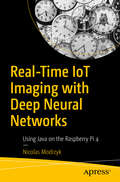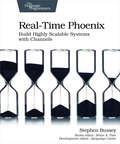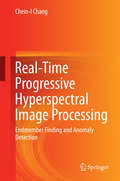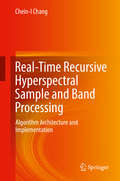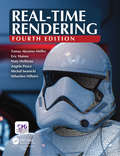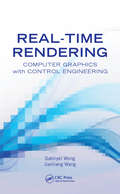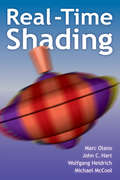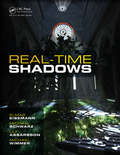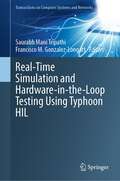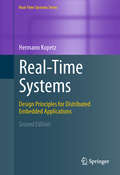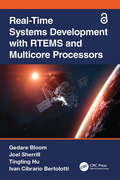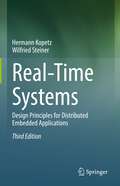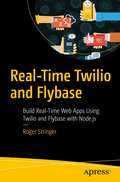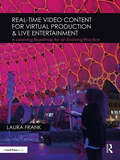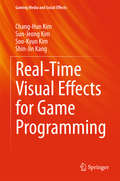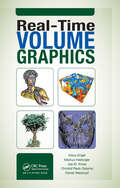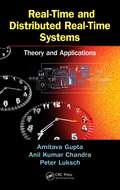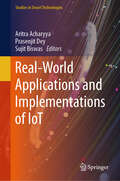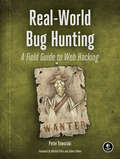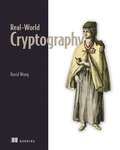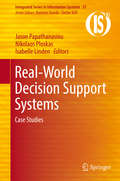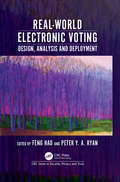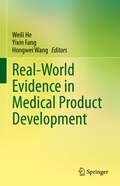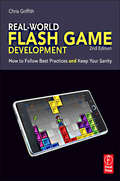- Table View
- List View
Real-Time IoT Imaging with Deep Neural Networks: Using Java on the Raspberry Pi 4
by Nicolas ModrzykThis book shows you how to build real-time image processing systems all the way through to house automation. Find out how you can develop a system based on small 32-bit ARM processors that gives you complete control through voice commands.Real-time image processing systems are utilized in a wide variety of applications, such as in traffic monitoring systems, medical image processing, and biometric security systems. In Real-Time IoT Imaging with Deep Neural Networks, you will learn how to make use of the best DNN models to detect object in images using Java and a wrapper for OpenCV. Take a closer look at how Java scripting works on the Raspberry Pi while preparing your Visual Studio code for remote programming. You will also gain insights on image and video scripting. Author Nicolas Modrzyk shows you how to use the Rhasspy voice platform to add a powerful voice assistant and completely run and control your Raspberry Pi from your computer. To get your voice intents for house automation ready, you will explore how Java connects to the MQTT and handles parametrized Rhasspy voice commands. With your voice-controlled system ready for operation, you will be able to perform simple tasks such as detecting cats, people, and coffee pots in your selected environment. Privacy and freedom are essential, so priority is given to using open source software and an on-device voice environment where you have full control of your data and video streams. Your voice commands are your own—and just your own.With recent advancements in the Internet of Things and machine learning, cutting edge image processing systems provide complete process automation. This practical book teaches you to build such a system, giving you complete control with minimal effort.What You Will Learn:Show mastery by creating OpenCV filtersExecute a YOLO DNN model for image detectionApply the best Java scripting on Raspberry Pi 4Prepare your setup for real-time remote programmingUse the Rhasspy voice platform for handling voice commands and enhancing your house automation setupWho This Book Is For:Engineers, and Hobbyists wanting to use their favorite JVM to run Object Detection and Networks on a Raspberry Pi
Real-Time Phoenix: Build Highly Scalable Systems with Channels
by Stephen BusseyGive users the real-time experience they expect, by using Elixir and Phoenix Channels to build applications that instantly react to changes and reflect the application's true state. Learn how Elixir and Phoenix make it easy and enjoyable to create real-time applications that scale to a large number of users. Apply system design and development best practices to create applications that are easy to maintain. Gain confidence by learning how to break your applications before your users do. Deploy applications with minimized resource use and maximized performance. Real-time applications come with real challenges - persistent connections, multi-server deployment, and strict performance requirements are just a few. Don't try to solve these challenges by yourself - use a framework that handles them for you. Elixir and Phoenix Channels provide a solid foundation on which to build stable and scalable real-time applications. Build applications that thrive for years to come with the best-practices found in this book. Understand the magic of real-time communication by inspecting the WebSocket protocol in action. Avoid performance pitfalls early in the development lifecycle with a catalog of common problems and their solutions. Leverage GenStage to build a data pipeline that improves scalability. Break your application before your users do and confidently deploy them. Build a real-world project using solid application design and testing practices that help make future changes a breeze. Create distributed apps that can scale to many users with tools like Phoenix Tracker. Deploy and monitor your application with confidence and reduce outages. Deliver an exceptional real-time experience to your users, with easy maintenance, reduced operational costs, and maximized performance, using Elixir and Phoenix Channels. What You Need:You'll need Elixir 1.9+ and Erlang/OTP 22+ installed on a Mac OS X, Linux, or Windows machine.
Real-Time Progressive Hyperspectral Image Processing
by Chein-I ChangThe book covers the most crucial parts of real-time hyperspectral image processing: causality and real-time capability. Recently, two new concepts of real time hyperspectral image processing, Progressive HyperSpectral Imaging (PHSI) and Recursive HyperSpectral Imaging (RHSI). Both of these can be used to design algorithms and also form an integral part of real time hyperpsectral image processing. This book focuses on progressive nature in algorithms on their real-time and causal processing implementation in two major applications, endmember finding and anomaly detection, both of which are fundamental tasks in hyperspectral imaging but generally not encountered in multispectral imaging. This book is written to particularly address PHSI in real time processing, while a book, Recursive Hyperspectral Sample and Band Processing: Algorithm Architecture and Implementation (Springer 2016) can be considered as its companion book.
Real-Time Recursive Hyperspectral Sample and Band Processing
by Chein-I ChangThis book explores recursive architectures in designing progressive hyperspectral imaging algorithms. In particular, it makes progressive imaging algorithms recursive by introducing the concept of Kalman filtering in algorithm design so that hyperspectral imagery can be processed not only progressively sample by sample or band by band but also recursively via recursive equations. This book can be considered a companion book of author's books, Real-Time Progressive Hyperspectral Image Processing, published by Springer in 2016.
Real-Time Rendering, Fourth Edition: High-quality And Real-time Rendering With Dxr And Other Apis
by Eric Haines Duane C. Abbey Naty HoffmanThoroughly updated, this fourth edition focuses on modern techniques used to generate synthetic three-dimensional images in a fraction of a second. With the advent of programmable shaders, a wide variety of new algorithms have arisen and evolved over the past few years. This edition discusses current, practical rendering methods used in games and o
Real-Time Rendering: Computer Graphics with Control Engineering (Automation and Control Engineering #49)
by Jianliang Wang Gabriyel WongConsumers today expect extremely realistic imagery generated in real time for interactive applications such as computer games, virtual prototyping, and scientific visualisation. However, the increasing demands for fidelity coupled with rapid advances in hardware architecture pose a challenge: how do you find optimal, sustainable solutions to accommodate both speed of rendering and quality? Real-Time Rendering: Computer Graphics with Control Engineering presents a novel framework for solving the perennial challenge of resource allocation and the trade-off between quality and speed in interactive computer graphics rendering. Conventional approaches are mainly based on heuristics and algorithms, are largely application specific, and offer fluctuating performance, particularly as applications become more complex. The solution proposed by the authors draws on powerful concepts from control engineering to address these shortcomings. Expanding the horizon of real-time rendering techniques, this book: Explains how control systems work with real-time computer graphics Proposes a data-driven modelling approach that more accurately represents the system behaviour of the rendering process Develops a control system strategy for linear and non-linear models using proportional, integral, derivative (PID) and fuzzy control techniques Uses real-world data from rendering applications in proof-of-concept experiments Compares the proposed solution to existing techniques Provides practical details on implementation, including references to tools and source code This pioneering work takes a major step forward by applying control theory in the context of a computer graphics system. Promoting cross-disciplinary research, it offers guidance for anyone who wants to develop more advanced solutions for real-time computer graphics rendering.
Real-Time Shading
by Marc Olano John Hart Wolfgang Heidrich Michael McCoolThis book covers real-time shading systems, their design and how they work. Procedural shading, long valued for off-line rendering and production animation is now possible on interactive graphics hardware. These developments are important for areas such as game development, product design, and scientific visualization, among others. The authors inc
Real-Time Shadows
by Elmar Eisemann Michael Schwarz Ulf Assarsson Michael WimmerImportant elements of games, movies, and other computer-generated content, shadows are crucial for enhancing realism and providing important visual cues. In recent years, there have been notable improvements in visual quality and speed, making high-quality realistic real-time shadows a reachable goal. Real-Time Shadows is a comprehensive guide to t
Real-Time Simulation and Hardware-in-the-Loop Testing Using Typhoon HIL (Transactions on Computer Systems and Networks)
by Francisco M. Gonzalez-Longatt Saurabh Mani TripathiThis book is an edited collection that explores the fundamental concepts of real-time simulation/hardware-in-the-loop testing using ‘Typhoon HIL’ for complex electrical systems. Typhoon HIL has recently emerged as a powerful tool in the rapidly growing field of ultra-high-fidelity controller-hardware-in-the-loop (C-HIL) simulations for power electronics, microgrids, and distribution networks. The book integrates the coverage of underlying theory and acclaimed methodological approaches and high-value applications of real-time simulation and hardware-in-the-loop testing—all from the perspectives of eminent researchers around the globe utilizing Typhoon HIL. This book serves as a valuable resource for engineers, academicians, researchers, experienced professionals, and research scholars engaged in /becoming familiarized with the real-time simulation of complex electrical systems using Typhoon HIL with a specific focus on hardware-in-the-loop testing.
Real-Time Software Design for Embedded Systems
by Hassan GomaaThis tutorial reference takes the reader from use cases to complete architectures for real-time embedded systems using SysML, UML, and MARTE and shows how to apply the COMET/RTE design method to real-world problems. The author covers key topics such as architectural patterns for distributed and hierarchical real-time control and other real-time software architectures, performance analysis of real-time designs using real-time scheduling, and timing analysis on single and multiple processor systems. Complete case studies illustrating design issues include a light rail control system, a microwave oven control system, and an automated highway toll system. Organized as an introduction followed by several self-contained chapters, the book is perfect for experienced software engineers wanting a quick reference at each stage of the analysis, design, and development of large-scale real-time embedded systems, as well as for advanced undergraduate or graduate courses in software engineering, computer engineering, and software design.
Real-Time Systems
by Hermann Kopetz"This book is a comprehensive text for the design of safety critical, hard real-time embedded systems. It offers a splendid example for the balanced, integrated treatment of systems and software engineering, helping readers tackle the hardest problems of advanced real-time system design, such as determinism, compositionality, timing and fault management. This book is an essential reading for advanced undergraduates and graduate students in a wide range of disciplines impacted by embedded computing and software. Its conceptual clarity, the style of explanations and the examples make the abstract concepts accessible for a wide audience." Janos Sztipanovits, Director E. Bronson Ingram Distinguished Professor of Engineering Institute for Software Integrated Systems Vanderbilt University Real-Time Systems focuses on hard real-time systems, which are computing systems that must meet their temporal specification in all anticipated load and fault scenarios. The book stresses the system aspects of distributed real-time applications, treating the issues of real-time, distribution and fault-tolerance from an integral point of view. A unique cross-fertilization of ideas and concepts between the academic and industrial worlds has led to the inclusion of many insightful examples from industry to explain the fundamental scientific concepts in a real-world setting. Compared to the first edition, new developments in complexity management, energy and power management, dependability, security, and the internet of things, are addressed. The book is written as a standard textbook for a high-level undergraduate or graduate course on real-time embedded systems or cyber-physical systems. Its practical approach to solving real-time problems, along with numerous summary exercises, makes it an excellent choice for researchers and practitioners alike.
Real-Time Systems Development with RTEMS and Multicore Processors (Embedded Systems)
by Gedare Bloom Joel Sherrill Tingting Hu Ivan Cibrario BertolottiThe proliferation of multicore processors in the embedded market for Internet-of-Things (IoT) and Cyber-Physical Systems (CPS) makes developing real-time embedded applications increasingly difficult. What is the underlying theory that makes multicore real-time possible? How does theory influence application design? When is a real-time operating system (RTOS) useful? What RTOS features do applications need? How does a mature RTOS help manage the complexity of multicore hardware?Real-Time Systems Development with RTEMS and Multicore Processors answers these questions and more with exemplar Real-Time Executive for Multiprocessor Systems (RTEMS) RTOS to provide concrete advice and examples for constructing useful, feature-rich applications. RTEMS is free, open-source software that supports multi-processor systems for over a dozen CPU architectures and over 150 specific system boards in applications spanning the range of IoT and CPS domains such as satellites, particle accelerators, robots, racing motorcycles, building controls, medical devices, and more.The focus of this book is on enabling real-time embedded software engineering while providing sufficient theoretical foundations and hardware background to understand the rationale for key decisions in RTOS and application design and implementation. The topics covered in this book include: Cross-compilation for embedded systems development Concurrent programming models used in real-time embedded software Real-time scheduling theory and algorithms used in wide practice Usage and comparison of two application programmer interfaces (APIs) in real-time embedded software: POSIX and the RTEMS Classic APIs Design and implementation in RTEMS of commonly found RTOS features for schedulers, task management, time-keeping, inter-task synchronization, inter-task communication, and networking The challenges introduced by multicore hardware, advances in multicore real-time theory, and software engineering multicore real-time systems with RTEMS All the authors of this book are experts in the academic field of real-time embedded systems. Two of the authors are primary open-source maintainers of the RTEMS software project.
Real-Time Systems: Design Principles for Distributed Embedded Applications
by Hermann Kopetz Wilfried Steiner"This book is a comprehensive text for the design of safety critical, hard real-time embedded systems. It offers a splendid example for the balanced, integrated treatment of systems and software engineering, helping readers tackle the hardest problems of advanced real-time system design, such as determinism, compositionality, timing and fault management. This book is an essential reading for advanced undergraduates and graduate students in a wide range of disciplines impacted by embedded computing and software. Its conceptual clarity, the style of explanations and the examples make the abstract concepts accessible for a wide audience."Janos Sztipanovits, DirectorE. Bronson Ingram Distinguished Professor of EngineeringInstitute for Software Integrated SystemsVanderbilt UniversityReal-Time Systems focuses on hard real-time systems, which are computing systems that must meet their temporal specification in all anticipated load and fault scenarios. The book stresses the system aspects of distributed real-time applications, treating the issues of real-time, distribution and fault-tolerance from an integral point of view. A unique cross-fertilization of ideas and concepts between the academic and industrial worlds has led to the inclusion of many insightful examples from industry to explain the fundamental scientific concepts in a real-world setting. Compared to the Second Edition, new developments in communication standards for time-sensitive networks, such as TSN and Time-Triggered Ethernet are addressed. Furthermore, this edition includes a new chapter on real-time aspects in cloud and fog computing.The book is written as a standard textbook for a high-level undergraduate or graduate course on real-time embedded systems or cyber-physical systems. Its practical approach to solving real-time problems, along with numerous summary exercises, makes it an excellent choice for researchers and practitioners alike.
Real-Time Twilio and Flybase: Build Real-Time Web Apps Using Twilio and Flybase with Node.js
by Roger StringerUse Flybase and Twilio with Node.js to build real-time solutions and understand how real-time web technologies work. Written by the founder of Flybase, this book offers you practical solutions for communicating effectively with users on the modern web.Flybase.io is a web platform, used to store and retrieve data in real-time, as well as to send and receive real-time events such as triggers for incoming calls, incoming messages, agents logging off, etc. You will learn to send daily SMS messages, build an SMS call center to provide support to users, and build a call center to handle incoming and outgoing phone calls from the browser. You'll also build a group calling system to let groups send messages to each other: handy for managing events.Real-Time Twilio brings to light using the winning combination of Flybase and Twilio with Node.js for anyone with basic web development skills.What You'll LearnDevelop web apps with Flybase and TwilioBuild a live blogging tool and a group chat appCreate a click-to-call call center and a Salesforce-powered call centerSend daily SMS remindersDevelop a real-time call tracking dashboardWho This Book Is ForThose who want to learn to use Twilio and who wants to learn real-time development.
Real-Time Video Content for Virtual Production & Live Entertainment: A Learning Roadmap for an Evolving Practice
by Laura FrankReal-Time Video Content for Virtual Production & Live Entertainment looks at the evolution of current software and hardware, how these tools are used, and how to plan for productions dependent on real-time content. From rock concerts to theatre, live television broadcast to film production, art installations to immersive experiences, the book outlines the various applications of real-time video content – the intersection of gaming and performance that is revolutionizing how films are made and how video content is created for screens. Rather than render out a fixed video file, new tools allow for interactive video content that responds to audience activity, camera position, and performer action in real time. Combining software renderers with environmental information, video content is generated nearly instantaneously to simulate depth, creating a new world of Virtual Production. This book provides an overview of the current software and hardware used to create real-time content while also reviewing the various external technologies the real-time content is dependent upon. Case studies from industry experts appear in each chapter to reinforce the tools described, establish industry practice, and provide insight on a complex and rapidly growing discipline. Real-Time Video Content for Virtual Production & Live Entertainment prepares students and practitioners for a future working with real-time technologies and informs current entertainment technology professionals how to rethink about their old roles using these new tools. The book includes access to a companion website featuring web-based and video resources that expand on topics covered in the text. Each chapter has a unique page that points to example material, video presentations, and professional studies on chapter topics. You can visit the companion website at rtv-book.com.
Real-Time Visual Effects for Game Programming
by Chang-Hun Kim Sun-Jeong Kim Soo-Kyun Kim Shin-Jin KangThis book introduces the latest visual effects (VFX) techniques that can be applied to game programming. The usefulness of the physicality-based VFX techniques, such as water, fire, smoke, and wind, has been proven through active involvement and utilization in movies and images. However, they have yet to be extensively applied in the game industry, due to the high technical barriers. Readers of this book can learn not only the theories about the latest VFX techniques, but also the methodology of game programming, step by step. The practical VFX processing techniques introduced in this book will provide very helpful information to game programmers. Due to the lack of instructional books about VFX-related game programming, the demand for knowledge regarding these high-tech VFXs might be very high.
Real-Time Volume Graphics
by Klaus Engel Markus Hadwiger Joe Kniss Christof Rezk-Salama Daniel WeiskopfBased on course notes of SIGGRAPH course teaching techniques for real-time rendering of volumetric data and effects; covers both applications in scientific visualization and real-time rendering. Starts with the basics (texture-based ray casting) and then improves and expands the algorithms incrementally. Book includes source code, algorithms, diagr
Real-Time and Distributed Real-Time Systems: Theory and Applications
by Amitava Gupta Anil Kumar Chandra Peter LukschDigital computers have revolutionized computation and transformed how computers are used to control systems in real life, giving birth to real-time systems. Furthermore, massive developments in the communications domain have made it possible for real-time systems to perform coordinated actions over communication interfaces, resulting in the evoluti
Real-World Applications and Implementations of IoT (Studies in Smart Technologies)
by Aritra Acharyya Prasenjit Dey Sujit BiswasThis book explores state-of-the-art internet of things (IoT) solutions for energy conservation, security, agricultural advancements, mining security, healthcare, and environmental protection. This book delves deep into the technology, offering a comprehensive analysis, detailed descriptions, and in-depth discussions of recently developed IoT applications. With a strong focus on the cutting-edge research at a global scale, the book combines IoT with artificial intelligence (AI), shedding light on emerging possibilities and advancements. Designed to cater to a broad audience, from those with a foundational understanding of science to seasoned engineering and technology experts, this book can serve as an essential resource for engineering students and science master's programs. Researchers seeking to stay at the forefront of IoT and AI will also find it invaluable.
Real-World Bug Hunting: A Field Guide to Web Hacking
by Peter YaworskiLearn how people break websites and how you can, too. Real-World Bug Hunting is the premier field guide to finding software bugs. Whether you're a cyber-security beginner who wants to make the internet safer or a seasoned developer who wants to write secure code, ethical hacker Peter Yaworski will show you how it's done. You'll learn about the most common types of bugs like cross-site scripting, insecure direct object references, and server-side request forgery. Using real-life case studies of rewarded vulnerabilities from applications like Twitter, Facebook, Google, and Uber, you'll see how hackers manage to invoke race conditions while transferring money, use URL parameter to cause users to like unintended tweets, and more.Each chapter introduces a vulnerability type accompanied by a series of actual reported bug bounties. The book's collection of tales from the field will teach you how attackers trick users into giving away their sensitive information and how sites may reveal their vulnerabilities to savvy users. You'll even learn how you could turn your challenging new hobby into a successful career. You'll learn:How the internet works and basic web hacking conceptsHow attackers compromise websitesHow to identify functionality commonly associated with vulnerabilitiesHow to find bug bounty programs and submit effective vulnerability reportsReal-World Bug Hunting is a fascinating soup-to-nuts primer on web security vulnerabilities, filled with stories from the trenches and practical wisdom. With your new understanding of site security and weaknesses, you can help make the web a safer place--and profit while you're at it.
Real-World Cryptography
by David Wong"A staggeringly comprehensive review of the state of modern cryptography. Essential for anyone getting up to speed in information security." - Thomas Doylend, Green Rocket Security An all-practical guide to the cryptography behind common tools and protocols that will help you make excellent security choices for your systems and applications.In Real-World Cryptography, you will find: Best practices for using cryptography Diagrams and explanations of cryptographic algorithms Implementing digital signatures and zero-knowledge proofs Specialized hardware for attacks and highly adversarial environments Identifying and fixing bad practices Choosing the right cryptographic tool for any problem Real-World Cryptography reveals the cryptographic techniques that drive the security of web APIs, registering and logging in users, and even the blockchain. You&’ll learn how these techniques power modern security, and how to apply them to your own projects. Alongside modern methods, the book also anticipates the future of cryptography, diving into emerging and cutting-edge advances such as cryptocurrencies, and post-quantum cryptography. All techniques are fully illustrated with diagrams and examples so you can easily see how to put them into practice. Purchase of the print book includes a free eBook in PDF, Kindle, and ePub formats from Manning Publications. About the technology Cryptography is the essential foundation of IT security. To stay ahead of the bad actors attacking your systems, you need to understand the tools, frameworks, and protocols that protect your networks and applications. This book introduces authentication, encryption, signatures, secret-keeping, and other cryptography concepts in plain language and beautiful illustrations. About the book Real-World Cryptography teaches practical techniques for day-to-day work as a developer, sysadmin, or security practitioner. There&’s no complex math or jargon: Modern cryptography methods are explored through clever graphics and real-world use cases. You&’ll learn building blocks like hash functions and signatures; cryptographic protocols like HTTPS and secure messaging; and cutting-edge advances like post-quantum cryptography and cryptocurrencies. This book is a joy to read—and it might just save your bacon the next time you&’re targeted by an adversary after your data. What's inside Implementing digital signatures and zero-knowledge proofs Specialized hardware for attacks and highly adversarial environments Identifying and fixing bad practices Choosing the right cryptographic tool for any problem About the reader For cryptography beginners with no previous experience in the field. About the author David Wong is a cryptography engineer. He is an active contributor to internet standards including Transport Layer Security. Table of Contents PART 1 PRIMITIVES: THE INGREDIENTS OF CRYPTOGRAPHY 1 Introduction 2 Hash functions 3 Message authentication codes 4 Authenticated encryption 5 Key exchanges 6 Asymmetric encryption and hybrid encryption 7 Signatures and zero-knowledge proofs 8 Randomness and secrets PART 2 PROTOCOLS: THE RECIPES OF CRYPTOGRAPHY 9 Secure transport 10 End-to-end encryption 11 User authentication 12 Crypto as in cryptocurrency? 13 Hardware cryptography 14 Post-quantum cryptography 15 Is this it? Next-generation cryptography 16 When and where cryptography fails
Real-World Decision Support Systems
by Jason Papathanasiou Isabelle Linden Nikolaos PloskasThis book presents real-world decision support systems, i. e. , systems that have been running for some time and as such have been tested in real environments and complex situations; the cases are from various application domains and highlight the best practices in each stage of the system's life cycle, from the initial requirements analysis and design phases to the final stages of the project. Each chapter provides decision-makers with recommendations and insights into lessons learned so that failures can be avoided and successes repeated. For this reason unsuccessful cases, which at some point of their life cycle were deemed as failures for one reason or another, are also included. All decision support systems are presented in a constructive, coherent and deductive manner to enhance the learning effect. It complements the many works that focus on theoretical aspects or individual module design and development by offering 'good' and 'bad' practices when developing and using decision support systems. Combining high-quality research with real-world implementations, it is of interest to researchers and professionals in industry alike.
Real-World Electronic Voting: Design, Analysis and Deployment (Series in Security, Privacy and Trust)
by FENG HAO AND PETER Y. A. RYANReal-World Electronic Voting: Design, Analysis and Deployment captures all major developments in electronic voting since 2003 in a real-world setting. It covers three broad categories: e-voting protocols, attacks reported on e-voting and new developments on the use of e-voting. This book explores recent innovations in both poll-site and remote voting systems and their application throughout the world. The requirements of elections are analysed, the available tools and technologies are described, and a variety of modern systems are presented in detail together with discussions of deployments. This is an invaluable resource for election professionals, researchers and policy makers alike. Key Features: Reviews both technical and social aspects of e-voting Covers e-voting protocols, attacks reported on e-voting and new developments on the use of e-voting Designed for government election practitioners and policy makers who want to understand the threats and opportunities in e-voting and assess its suitability for future elections
Real-World Evidence in Medical Product Development
by Weili He Hongwei Wang Yixin FangThis book provides state-of-art statistical methodologies, practical considerations from regulators and sponsors, logistics, and real use cases for practitioners for the uptake of RWE/D. Randomized clinical trials have been the gold standard for the evaluation of efficacy and safety of medical products. However, the cost, duration, practicality, and limited generalizability have incentivized many to look for alternative ways to optimize drug development. This book provides a comprehensive list of topics together to include all aspects with the uptake of RWE/D, including, but not limited to, applications in regulatory and non-regulatory settings, causal inference methodologies, organization and infrastructure considerations, logistic challenges, and practical use cases.
Real-World Flash Game Development: How to Follow Best Practices AND Keep Your Sanity
by Christopher GriffithYour deadline just got moved up. Your artist has never worked with Flash before. Your inner programmer is telling you that no OOP is a big Oops! Any Flash developer can share similar tales of woe. This book breaks down the process of Flash game development into simple, approachable steps. Never heard of a game loop before? No idea what a design pattern is? No problem! Chris Griffith gives you real-world expertise, and real-world code that you can use in your own games. Griffith has been building games in Flash long enough to know what works and what doesn't. He shows you what you need to know to get the job done. Griffith covers Flash for the everyday developer. The average Flash developer doesn't have luxurious timelines, employers who understand the value of reusability, or the help of an information architect to design a usable experience. This book helps bridge the gap for these coders who may be used to C++, Java, or C# and want to move over to Flash. Griffith covers real-world scenarios pulled from his own experiences developing games for over 10 years in the industry. The 2nd edition will include: completely new game examples on more advanced topics like 3D; more robust physics and collision detection; and mobile device coverage with Android platform development for us on phones and tablets. Also coverage of the new features available in Flash CS5, Flash Player 10.1, and AIR 2.0 that can be used for game development.The associated web site for the book: www.flashgamebook.com gets close to 1,000 visits a month. On the site, readers can find all the source code for the examples, news on industry happenings, updates and special offers, and a discussion forum to ask questions and share ideas.
